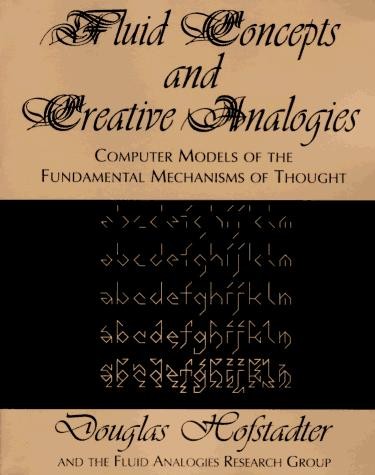Check nearby libraries
Buy this book

Two ideas pervade the research. One is that the key question to answer is "What is a concept?" This means understanding how concepts overlap and trigger one another, how their fluid boundaries come about, how they give rise to generalizations and analogies, and so on. The second idea is that mental activity is fundamentally parallel, with many tiny agents independently carrying out small "subcognitive" acts and collectively building up coherent mental structures.
Such agents lie far above the neural level, yet far below the conscious level; the hypothetical level of the brain at which they reside thus constitutes a largely uncharted substrate for thought.
With these intuitions as guides, Hofstadter and the members of the Fluid Analogies Research Group have developed computer models that operate in small but extraordinarily challenging domains: playful anagram and number puzzles, analogy puzzles involving letter strings or tabletop objects, and fanciful alphabetic styles.
These subtle ideas are spelled out with verve, charm, and clarity by Hofstadter and his co-workers in a series of chapters alternating with prefaces; the latter tie the projects together and give insight into their evolution.
Readers of earlier works by Hofstadter will find this book a natural extension of his style and his ideas about creativity and analogy; in addition, psychologists, philosophers, and artificial-intelligence researchers will find in this elaborate web of ingenious ideas a deep and challenging new view of mind.
Since 1977, Douglas R. Hofstadter and his graduate students at Indiana University and the University of Michigan have been developing computer models of discovery, creation, and analogical thought. What has emerged is a sophisticated and unorthodox vision of the mind in which perception, at an abstract level, is the key: perception of situations, of patterns, of patterns among patterns, even perception of one's perceptions.
Fluid Concepts and Creative Analogies conveys this bold vision to a broad public as well as to cognitive scientists.
Check nearby libraries
Buy this book

Previews available in: English
Subjects
Cognitive science, Analogy, Computer simulation, Artificial intelligence, Analogie (Philosophie), Simulation par ordinateur, Computermodellen, Computersimulation, Sciences cognitives, Kognition, Denken, Waarneming, Künstliche Intelligenz, Kunstmatige intelligentie, Simulatiemodellen, Intelligence artificielleShowing 5 featured editions. View all 5 editions?
| Edition | Availability |
|---|---|
|
1
Fluid Concepts and Creative Analogies: Computer Models of the Fundamental Mechanisms of Thought
1998, Penguin Books, Limited
in English
0140258353 9780140258356
|
zzzz
Libraries near you:
WorldCat
|
|
2
Fluid concepts and creative analogies: computer models of the fundamental mechanisms of thought
1997, Allen Lane, The Penguin Press, Penguin Books
in English
0713991550 9780713991550
|
zzzz
Libraries near you:
WorldCat
|
|
3
Die FARGonauten: Über Analogie und Kreativität
October 1, 1996, Klett-Cotta
Hardcover
in German
3608917586 9783608917581
|
zzzz
Libraries near you:
WorldCat
|
|
4
Fluid Concepts and Creative Analogies
March 1, 1996, Basic Books
in English
0465024750 9780465024759
|
zzzz
Libraries near you:
WorldCat
|
|
5
Fluid concepts & creative analogies: computer models of the fundamental mechanisms of thought
1995, Basic Books
in English
0465051545 9780465051540
|
aaaa
Libraries near you:
WorldCat
|
Book Details
Edition Notes
Includes bibliographical references (p. [493]-501) and index.
Classifications
The Physical Object
ID Numbers
Source records
Scriblio MARC recordLibrary of Congress MARC record
marc_openlibraries_sanfranciscopubliclibrary MARC record
Internet Archive item record
Internet Archive item record
Library of Congress MARC record
Promise Item
marc_columbia MARC record
Work Description
Readers of earlier works by Douglas Hofstadter will find this book a natural extension of his style and his ideas about creativity and analogy; in addition, psychologists, philosophers, and artificial-intelligence researchers will find in this elaborate web of ingenious ideas a deep and challenging new view of mind.
Community Reviews (0)
Feedback?| November 28, 2022 | Edited by Stew | Fix title. |
| November 27, 2022 | Edited by OnFrATa | Merge works (MRID: 29415) |
| November 25, 2022 | Edited by Stew | Add translation info. |
| April 28, 2010 | Edited by Open Library Bot | Linked existing covers to the work. |
| December 9, 2009 | Created by WorkBot | add works page |












